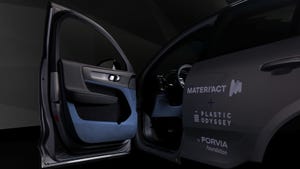Be nice to old extrusion machinery. Don’t be too quick to say “get a new one” rather than fixing what you think is wrong. Screw replacement is a good example. Even if we can prove a screw is worn, we need to justify the cost of a new one, which is not as simple as it sounds.
September 10, 2020

The old stuff is us. Before around 1950, and especially before 1900, we oldsters were needed to teach the young ones how to do the things they needed to learn: When to plant what; how to ride a horse or drive a car; wash and cook; fix and build. And all that with little or no plastics. I even remember my first telephone, a metal one with an actual round dial and a wire into the wall.
Then, by 1950, parents and children were learning things together. They flew on airplanes, visited other places (and came home again), used a washing machine and dryer, and learned more at school than at home. (My mother taught me to read and my father taught me to fix and build.) Other grownups taught me things less essential to daily survival but still useful, like chemistry and music.
Now we get everything with minimal grownup involvement. They teach us how to get the most from the internet and social media. (I still resist Facebook and Twitter, but not LinkedIn.) So, what good are we now, and what does this have to do with extrusion?
We can still be models of the Three Ps: Patience, Politeness, and Persistence, a useful formula for getting problems solved and avoiding others. If we are lucky enough to remember clearly, we can be our own Google and advise colleagues about the probable outcome of an action, and sometimes a simple way to do it, learned when that was all we had. We can temper the angelization of data with the reality that we humans have to work with the results. It is human nature to believe what we want to be true — we are the sales department for our ideas.
So, be nice to old machinery. Don’t be too quick to say “get a new one” rather than fixing what you think is wrong. Screw replacement is a good example. Even if we can prove a screw is worn, we need to justify the cost of a new one — time and money — by showing how the old one loses enough to pay for the change, which is not as simple as it sounds. Remember: Higher output is not always more money until it is equal quality and we can sell it profitably. If it needs a higher RPM and, thus, gets a higher melt temperature, can we add something to compensate? Sometimes adjusting rear-barrel temperature to bite more for each rev means you don’t have to raise RPM at all.
Part of keeping old machines going is not losing the owners’ manuals and, especially, the electrical circuit diagrams. They are sometimes kept with the machine, and it should be part of preventive maintenance to ensure that such information is available when needed. Also, check electrical connections for tight contacts and defective insulation, and calibrate thermocouples and other sensors. One pellet in a thermocouple well will throw off the reading, as will fluctuating temperatures at the inner junctions of the wires.
Getting a new anything means getting used to it and shedding some old habits. (That holds true for cars, houses, babies, jobs, etc.) The familiar feels good. But DC motors don’t work like AC motors, and there are several different kinds of AC, so you may have to understand them all. And some old needle (analog) gauges can tell you more than the modern digitals because their wiggle is a measure of process stability, which may show up in thickness variation.
Lighting is another example: Bring lights closer and make reflectors instead of getting new fixtures.
Old extrusion lines can still find a use after replacement: Pelletize and filter your own or purchased scrap, or make your own compound; use it to test new materials; or donate it to a school. I once heard of a line that didn’t work being donated, and the students’ project was to find out what was wrong, fix it, and make it run again. I don’t know if they resold the machine back into industry and got another for the same purpose, but I like the idea.
Underneath all of this is the image of new being better, cleaner, lasting longer, etc. There is a place for trying new ideas and doing things differently, but it should not be allowed to run rampant. Balance is needed. A generation earlier, I would have learned horsemanship, the balance between control and motion that got us where we wanted to go. We elders are the anchor to the sail, the ballast to the balloon, the pull of gravity to the wing-lift. So, keep us alive long enough to allow us to give back what we’ve learned by keeping our eyes and minds open. In my case, that includes the knowledge that plastics are nontoxic and helpful to our health and the environment, and the need to know why so many people don’t agree. For more on this, see my article, "An Open Letter to ‘Plastiphobes’ about the Material You Love to Hate."
No live seminars planned in the near future, or maybe ever, as my virtual audiovisual seminar is even better than live. No travel, no waiting for live dates, same PowerPoint slides but with my audio explanations and a written guide. Watch at your own pace; group attendance is offered for a single price, including the right to ask questions and get thorough answers by e-mail. Call 301/758-7788 or e-mail [email protected] for more info.
About the author
Allan Griff is a veteran extrusion engineer, starting out in tech service for a major resin supplier, and working on his own now for many years as a consultant, expert witness in law cases, and especially as an educator via webinars and seminars, both public and in-house, and now in his new audiovisual version. He wrote Plastics Extrusion Technology, the first practical extrusion book in the United States, as well as the Plastics Extrusion Operating Manual, updated almost every year, and available in Spanish and French as well as English. Find out more on his website, www.griffex.com, or e-mail him at [email protected].
About the Author(s)
You May Also Like




